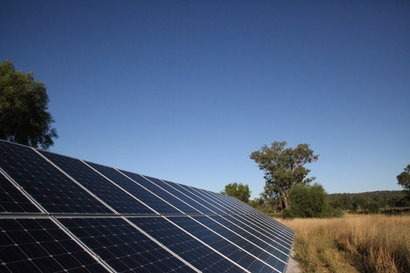
NREL will be working in partnership with Sandia National Laboratories, Lawrence Berkeley National Laboratory, and SLAC National Accelerator Laboratory, aiming to develop durable PV module materials to provide low-cost electricity.
The Durable Module Materials (DuraMat) National Lab Consortium will receive approximately $30 million over five years from the Energy Department's SunShot Initiative. Overall, SunShot funds projects designed to accelerate the market competitiveness of solar power and has chosen to focus the DuraMat programme on module materials to complement the SunShot portfolio.
Teresa Barnes, from NREL's Materials Science Center, will be the director for DuraMat. Anthony Martino of Sandia National Laboratories will be the deputy director.
“DuraMat provides easily accessible capabilities that bring the national lab and university research infrastructure together with the PV and supply-chain industries” said Teresa Barnes. “Our research strategy integrates data analytics, module durability testing, prototyping, predictive modeling, field deployment, materials discovery, materials forensics, and technology transfer to accelerate module material development and reduce the cost of electricity from photovoltaics.”
DuraMat is part of the Energy Materials Network (EMN), an initiative launched by the Energy Department's Office of Energy Efficiency and Renewable Energy (EERE) in February. The aim of the EMN is to give US entrepreneurs and manufacturers a competitive edge in the global race for clean energy. EMN focuses on tackling one of the major barriers to widespread commercialisation of clean energy technologies - namely the design, testing, and production of advanced materials. By strengthening and facilitating industry access to the unique scientific and technical advanced materials innovation resources available at the Energy Department's national labs, the network will help industry bring these materials to market more quickly.
The DuraMat consortium will provide industry and academia the expertise and capabilities that can only be found at the national laboratories. DuraMat will develop unique capabilities to more quickly develop, characterise, and deploy new materials and architectures that will improve the value of PV modules for PV manufacturers, plant developers, financiers, and utilities. With module materials already accounting for 40 percent or more of the total PV module costs, DuraMat will address the substantial opportunities that exist for durable, high-performance, low-cost materials for module components.
EERE has previously launched several other consortia, including the Lightweight Materials Consortium (LightMat) focusing on lightweight materials for various applications, Electrocatalysis Consortium (ElectroCat) on new catalysts in fuel cells, and Caloric Cooling Consortium (CaloriCool) on refrigerant materials for cooling applications. Three more consortia are anticipated to be announced in fiscal year 2017.
EERE believes that dramatically accelerating the development of new PV module materials will clear the way for significant reductions in the cost of solar power. It is expected that DuraMat will lead to dependable, high-performance, low-cost PV module materials and architectures. It will seek to achieve this by developing module technologies that enable dramatic reductions in the levelised cost of energy (LCOE) from solar power, building a network of active collaborations from within national laboratories, academia and industry and moving highly promising module materials and technologies from early stages of research to successful deployment in the marketplace at an accelerated rate.
The Energy Department's SunShot Initiative is a collaborative national effort that aggressively drives innovation to make solar energy fully cost-competitive with traditional energy sources before the end of the decade. Through SunShot, the Energy Department supports efforts by private companies, universities, and national laboratories to drive down the cost of solar electricity to $0.06 per kilowatt-hour.
NREL is the U.S. Department of Energy's primary national laboratory for renewable energy and energy efficiency research and development. NREL is operated for the Energy Department by The Alliance for Sustainable Energy, LLC.
Image: NREL
For additional information:
Durable Module Materials (DuraMat) National Lab Consortium

